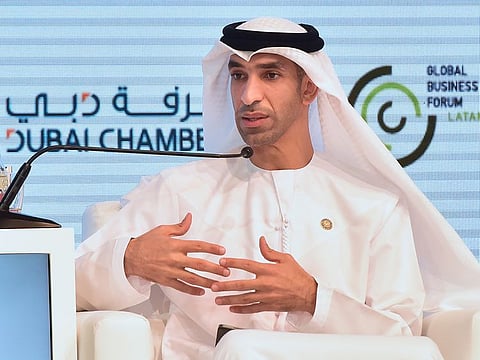UAE wants to have direct access to 90% of global trade flows in 5 years
UAE will pursue CEPA deals with key Latin American economies, says trade minister

Dubai: The UAE’s goal is to get a direct exposure to 90 per cent of global trade in the next five years, according to the country’s trade minister.
“Similar to Hong Kong capitalizing on China’s growth to boost its GDP, any positive impact on India’s growth will have an effect on the UAE due to the CEPA agreement,” said Dr. Thani Bin Ahmed Al Zeyoudi, Minister of State for Foreign Trade.
Talking about the shift towards Asian markets, Al Zeyoudi said “We want to be part of their growth journey. I am looking at the Asia markets, and Indonesia in specific have an Islamic economy which creates a lot of jobs and possibilities. So it’s going to open more doors for us by linking ourselves with Indonesia.”
“We recently announced eight countries, but our ultimate goal is to open our trade to 90 per cent of the global trade within five years. That’s why we are coming to Latin America and we will continue opening up by linking our economy to the rest of the world.”
The UAE accounted for 77 per cent of GCC investments in Latin American markets between 2016-21, which amounted to $4 billion over the same period. Saudi Arabia accounted for 22 per cent. Half of the investments from the GCC were directed to logistics, distribution and transportation companies. Dubai’s DP World is a major investor there.
On the other hand, foreign direct investment from Latin America into the GCC between 2017-21 was estimated at under $500 million, of which 85 per cent of FDI was sourced from Brazil and 13 per cent from Argentina. Some of the biggest investments were made by Brazil’s BRF, one of the world’s biggest food processing companies and a leading supplier of poultry to the GCC markets.
“We are talking about more than 400 million people which means that there is a huge potential for our investments, trade and exports to and from the UAE,” the minister said.
Global food security
The ongoing geopolitical crises have wider repercussions on global food security. A quarter of global wheat exports come from Russia and Ukraine. Around 40 per cent of wheat and corn from Ukraine is imported in the Middle East and Africa. Russia is also the world’s largest fertilizer producer. Even before the conflict, a spike in fertilizer prices last year contributed to a rise in food prices by about 30 per cent.
“Latin America is one of the sources of food globally,” said Al Zeyoudi. “And we just focus on bringing this process to the continent and I am sure that going to be one of the main solutions to the global food security issue.”
The CEPA deal
According to Al Zeyoudi, “We are going to ensure that we are moving from a regional hub to a global hub. One of them is moving ahead with Comprehensive Economic Partnership agreements.”
He said that the UAE will not “confine itself” with certain regions. “We’re going to make sure that we are opening the market access to our investors and companies and continue to explore more business purchases in Latin America.”
India-UAE CEPA deal
Earlier this year India and UAE signed a CEPA deal that will boost bilateral trade from the current $60 billion to $100 billion in the next five years.
Sign up for the Daily Briefing
Get the latest news and updates straight to your inbox


